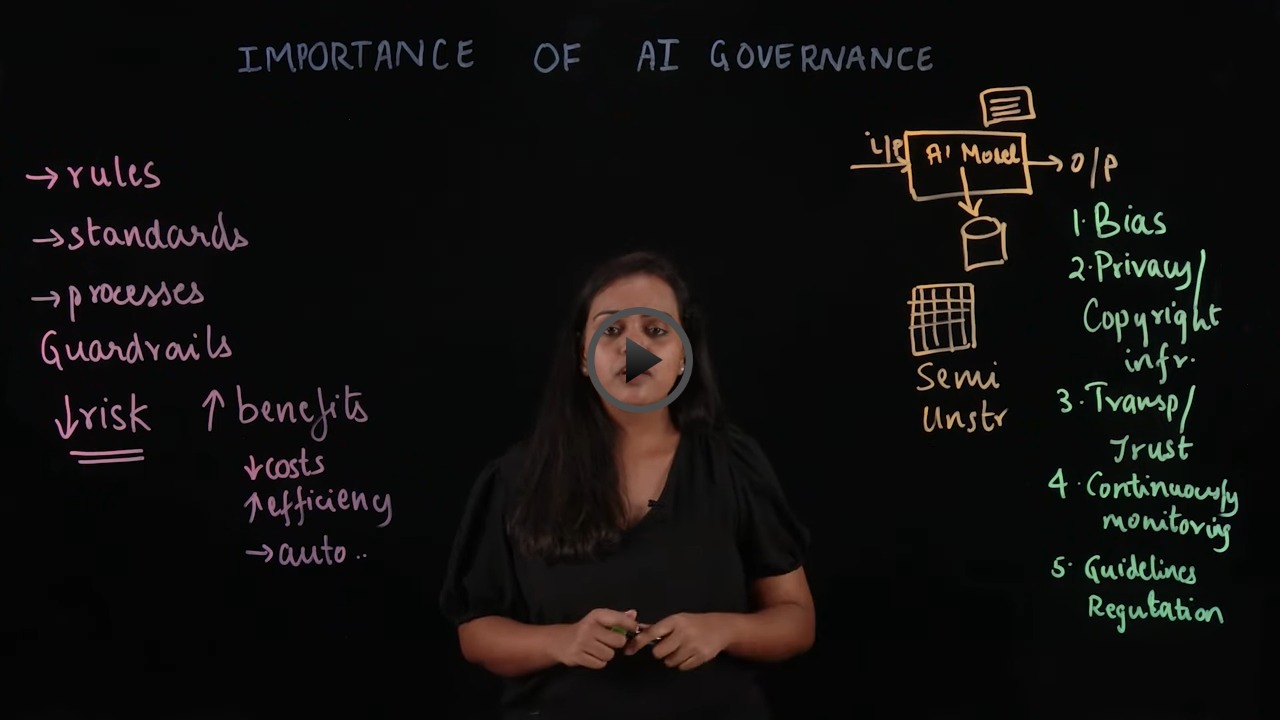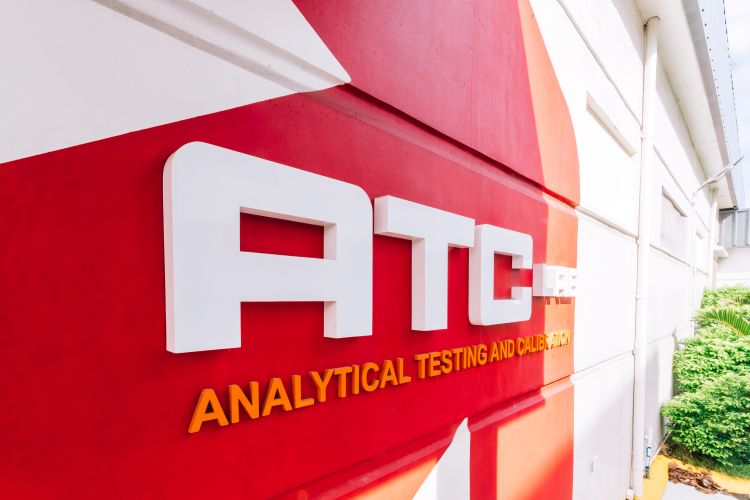Why You Need to Learn AI Governance

AI adoption is skyrocketing across sectors, such as healthcare, education, and the automotive market. With this rise, governance has become increasingly important, ensuring ethical use, regulatory compliance, and accountability in AI-driven systems.
AI governance sets standards and safeguards to ensure smart systems are ethical, safe, and respectful of human rights. It provides a legal framework for responsible research and development, bridging gaps between ethics and accountability. By incorporating social indicators, it helps promote fairness and responsible use in society.
Additionally, AI governance mitigates flaws from human influence in AI development, reducing biases and errors that can lead to discrimination and harm. This ensures that system integration involves continuous oversight, assessment, and improvements of machine learning algorithms to prevent flaws and negative outcomes while maintaining high-quality data sets.
(Also read: Top 7 AI Trends in Manufacturing)
Why AI Governance Matters
AI is rapidly reshaping society, including manufacturing technologies and industries, at a speed that’s challenging to follow. This makes strong policies and governance more essential than ever to safeguard the following:
-
Human rights protection
Humans are highly susceptible to harm when machine learning algorithms make flawed decisions. AI governance guides how to address unfair or unethical results, especially when biases, such as racial profiling, misrepresent user data. These errors can lead to wrongful denial of services and benefits and misidentification in criminal investigations.
-
Regulation compliance
The widespread use of AI across sectors, including manufacturing markets and industries, has raised concerns about ethics, transparency, and compliance with regulations. Without strong governance, AI may cause biased decisions, privacy breaches, and data misuse.
-
Ethical standards
Initial compliance is just the beginning; AI governance ensures long-term ethical standards. As models evolve, reliability may shift. Future-ready policies emphasize social responsibility and reduce financial, legal, and reputational risks.
-
Responsible tech growth
Sustainable innovation thrives under AI governance, which sets ethical standards and ensures accountability. By requiring systems to test solutions effectively, it minimizes biases and risks. Strong policies drive progress while preventing harm, fostering trust and transparency.
(Also read: AI Gets a Common-Sense Boost)
Foundations of AI governance
Responsible AI governance helps organizations protect themselves and their clients, providing ethical guidelines for developing and using AI.
-
Transparency
AI systems must be transparent, ensuring clarity in their decision-making processes. Organizations should openly explain algorithm logic. People must be notified when AI is used and understand how it functions, fostering trust and informed interactions with automated technologies.
-
Accountability
Accountability is a cornerstone of AI governance, ensuring organizations take ownership of AI’s outcomes. By establishing strict standards and monitoring AI’s effects, businesses uphold ethical responsibility and mitigate risks.
-
Consideration
AI governance requires organizations to prioritize social impact alongside technological and financial gains. Companies must anticipate AI's effects on diverse stakeholders, ensuring fairness through sound decision-making and responsible systems development.
-
Equity assurance
Ensuring fairness in AI requires thorough scrutiny of training data to eliminate embedded biases that could lead to discriminatory outcomes. By prioritizing impartiality, organizations cultivate inclusivity while mitigating unintended prejudices in AI tools.
-
Safety and efficiency
AI systems must undergo thorough analysis and continuous evaluation to confirm they operate safely and as expected. They should never be designed in ways that could pose risks to individuals, allowing users to verify performance, address potential issues, and uphold safety standards.
-
Data privacy
Data privacy ensures individuals retain control over their personal information. This prevents the misuse of personal information, protects individuals from identity theft and discrimination, and upholds trust. Without privacy safeguards, AI systems can enable mass surveillance, data exploitation, and unethical decision-making.
-
Human safety net
People should have the option to bypass AI-driven systems and choose human assistance when necessary. This ensures flexibility, acknowledges individual preferences and maintains human oversight in situations where automation may not be suitable or reliable.
AI governance in action
AI governance involves policies, frameworks, and practices that guide the ethical and responsible use of AI across various industries and government sectors.
-
General Data Protection Regulation (GDPR)
The GDPR plays a key role in AI governance, especially when AI systems process personal information within the EU. While not solely focused on AI, its regulations ensure compliance with privacy, cybersecurity, and transparency standards, safeguarding individuals' data from misuse and reinforcing accountability in automated processes.
-
Organization for Economic Co-operation and Development (OECD)
AI Principles, crafted by the OECD member countries in May 2019, guide responsible AI development. They promote transparency and fairness, ensuring AI systems align with human rights and democratic values. By providing regulatory frameworks, the OECD helps governments balance innovation with ethical AI governance and personal data protection.
-
Ethics committees
Many organizations have formed ethics committees to ensure their AI projects adhere to ethical norms and societal expectations. For instance, Sony established its AI Ethics Office in 2021 to provide expertise across all business units. This office launched an AI Ethics Research initiative, focusing on ethical data collection, bias detection, and mitigation, particularly in computer vision.
How to implement AI governance
Turning principles into practice requires strategic implementation, as AI governance must go beyond theory to include concrete policies and actionable frameworks.
-
Set clear goals
Establish your objectives and core values to shape AI governance, ensuring moral guidelines, openness, and responsibility. A structured framework enhances compliance and improves operational efficiency while aligning AI practices with business priorities.
-
Strengthen the data management framework
Strong data oversight is essential for AI governance. Maintain ethical, clear, and secure data practices with firm policies for gathering, storing, handling, and distributing information responsibly.
-
Promote collaboration
AI governance goes beyond IT teams, requiring broad input. Involve stakeholders from legal, compliance, and human resources to develop a cohesive strategy that aligns with business priorities and regulatory requirements.
-
Perform routine reviews and evaluations
Ongoing reviews are crucial for enforcing AI regulations. Assess ethical impacts, detect biases, and measure the success of clarity and responsibility initiatives to maintain compliance and reliability.
-
Ensure clarity
Openness and clear reasoning are vital for AI governance. Design systems with understandable processes, allowing users and stakeholders to grasp decision-making logic and maintain trust in automated solutions.
-
Offer Learning and Development
Prepare teams with expertise to handle AI management challenges. Deliver instruction on responsible AI use, information handling, and technical foundations to ensure informed decision-making and compliance with guidelines. In summary, effective AI governance ensures ethical, transparent, and responsible AI development. As regulations evolve, proactive governance will be essential in maintaining trust, compliance, and the proper integration of AI into society and business.
In summary, effective AI governance ensures ethical, transparent, and responsible AI development. As regulations evolve, proactive governance will be essential in maintaining trust, compliance, and the proper integration of AI into society and business. As one of the Top 20 EMS companies in the world, IMI has over 40 years of experience in providing electronics manufacturing and technology solutions.
As one of the Top 20 EMS companies in the world, IMI has over 40 years of experience in providing electronics manufacturing and technology solutions.
We are ready to support your business on a global scale.
Our proven technical expertise, worldwide reach, and vast experience in high-growth and emerging markets make us the ideal global manufacturing solutions partner.
Let's work together to build our future today.
Other Blog


